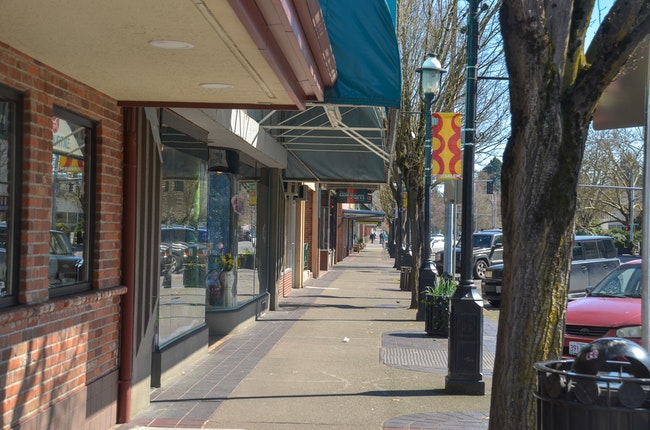
Downtown Salem’s usually busy streets were nearly empty during the lunch hour on March 17, 2020, the first day of a statewide restaurant closure. (Rachel Alexander/Salem Reporter)
Business groups warned on Friday that expansive new restrictions from Gov. Kate Brown intended to slow the spread of Covid could cause already strained restaurants and other small companies to close further.
They asked Brown to consider other measures aimed at addressing small private gatherings that public health officials say are driving the spread. The new restrictions close restaurants and bars, allowing them to only offer takeout. Retailers will also have limited capacity.
Shortly after Brown announced the “two-week freeze” over 30 business groups — including local chambers of commerce, agricultural interests, beer and wine producers and others — sent Brown a letter asking her to dial back her restrictions.
“We know you are facing difficult decisions with far-reaching implications, but we implore you to pause a moment and consider alternatives to renewed business closures and curtailed operations,” the letter said.
RELATED COVERAGE: As Covid spreads rapidly across Oregon, Gov. Kate Brown orders state to “freeze”
Stating that businesses have abided by pandemic regulations and workplaces affected by the pandemic have accounted for a sliver of new cases, the letter asked the governor to instead focus on testing and contact tracing while mounting a new public relations campaign to change Oregonians’ habits. The letter also noted that the earlier clamp-down on the economy was accompanied by federal programs to help workers and businesses. But Congress is not poised to approve any new relief packages.
“We hope you will consider the very real impact such a decision will have on struggling businesses, the employees who may lose their jobs, and our already troubled state economy,” the letter said.
Other business groups also issued statements citing specific concerns, offering some solutions and warning of what could happen.
Anthony Smith, the Oregon state director for the National Federation of Independent Businesses said in a statement that one in five members of the federation have indicated that they will be able to continue operating for a maximum of six months under the current conditions.
“Another 19% are saying 12 months. In total, that’s nearly 40% of small businesses that are looking at a permanent closure within the year,” he said in the statement. “If economic conditions worsen, the timeline will likely shorten.”
Jason Brandt, President and CEO of the Oregon Restaurant and Lodging Association, said in a statement that the new restrictions imperil the livelihoods of bar and restaurant owners as well as the employees that are already struggling under pandemic restrictions.
“We continue to be asked to make significant sacrifices as an industry due to the nature of our business models,” said Brandt. “This latest round of regulations focused on restaurants will trigger an unknown amount of permanent closures impacting the livelihoods of thousands of Oregon families.”
The statement suggested creating a $75 million “Hospitality Relief Fund” to help restaurants, bars, breweries, cideries, lodging properties and other hospitality-related businesses keep afloat. The statement didn’t specify where the money would come from.
It also called for waiving or discounting business licenses and fees, and to extend the current eviction on commercial properties.
Brown acknowledged the rules would have significant economic consequences and urged Oregonians to order takeout and shop local to support small businesses. She also again called on Congress to pass a relief package.
“With restaurants continuing takeout service and retail at 75% capacity, I can’t underscore enough how important it is to continue to support our local businesses,” Brown said.
The Northwest Grocery Association urged calm in response to the new orders. In a statement, the association said local grocers may proactively limit the number of items that can be purchased. But it said that “grocers will continue to meet the demand and need” of Oregonians, who were urged not to begin panic-buying.
“We are seeing little evidence of the need to stockpile. Our supply chains remain strong,” said Amanda Dalton, spokeswoman for the association, in a statement. “We urge Oregon consumers to be patient with each other and our grocers as limits are enforced, if necessary, to help prevent stock-piling or hoarding.”
The statement also stressed the need for people to wear masks at all times outside of the home, as store employees have been doing while at work for months.
The Oregon AFL-CIO responded to the new restrictions with a statement pointing to data that workplace outbreaks are on the rise and “are a significant part of what is fueling the new increase in cases statewide.”
Analyzing Oregon Health data from Nov. 12, the labor union concluded “that there have been 9,226 cases reported stemming for workplace outbreaks, up from 8,605 last week. The number of Oregonians who have died as a result of workplace COVID-19 spread has increased as well, with 45 deaths this week, compared to 37 from last week’s report.”
However, the union said that correctional institutions, food processing facilities and the retail sector are seeing spikes in cases. Restaurants and drinking establishments account for just 3% of recorded workplace outbreaks.
“It’s terrifying,” Kenny Doyle, a Fred Meyer worker in Clackamas and member of United Food and Commercial Workers Local 555, said in a statement. “We see COVID-19 infections and deaths among retail workers rising dramatically and yet workers like myself are largely unprotected. Each day I am choosing to not only risk my health and safety to earn a paycheck, but I am also putting my family and my community at risk.”
Contact reporter Jake Thomas at 503-575-1251 or [email protected] or @jakethomas2009.
SUPPORT SALEM REPORTER’S JOURNALISM – A monthly subscription starts at $5. Go HERE. Or contribute to keep our reporters and photographers on duty. Go HERE. Checks can be sent: Salem Reporter, 2925 River Rd S #280 Salem OR 97302. Your support matters.









